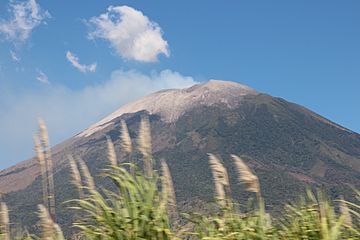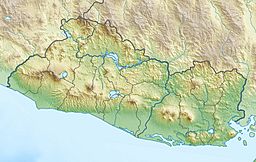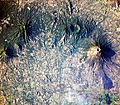San Miguel (volcano) facts for kids
Quick facts for kids San Miguel |
|
|---|---|
| Volcán Chaparrastique | |

Volcano in 2013
|
|
| Highest point | |
| Elevation | 2,130 m (6,990 ft) |
| Geography | |
| Geology | |
| Mountain type | Stratovolcano |
| Last eruption | 16 November 2022 |
San Miguel is a tall, cone-shaped volcano in El Salvador. It is also known as Volcán Chaparrastique. This volcano is located in the eastern part of El Salvador, about 15 kilometers (9 miles) southwest of the city of San Miguel. It is an active volcano, meaning it can erupt.
Contents
What is San Miguel Volcano?
San Miguel is a type of volcano called a stratovolcano. Stratovolcanoes are known for their steep slopes and cone shape. They are built up over many eruptions of lava, ash, and rocks. These volcanoes can be very powerful when they erupt.
Past Eruptions
San Miguel volcano has erupted several times in recent history. These eruptions help scientists learn more about how volcanoes work.
The 2002 Eruption
On January 16, 2002, San Miguel had a small eruption. It released steam, gas, and some ash from its top crater. This eruption lasted for about three hours. Luckily, it did not cause any serious damage to people or homes.
Scientists had been watching the volcano closely before this eruption. They were measuring the amount of carbon dioxide gas coming out. This gas is a type of greenhouse gas. They noticed that the gas levels were slowly increasing, which was a sign that an eruption might happen.
The 2013 Eruption
Twelve years later, on December 29, 2013, San Miguel erupted again. This eruption was bigger than the one in 2002. At 10:30 in the morning, the volcano sent ash and smoke high into the sky.
Before this eruption, there was a lot of seismic activity. This means there were many small earthquakes happening inside the volcano. These tremors started at 6:30 in the morning and showed that the volcano was becoming more active. Because of the danger, thousands of people living near the volcano had to leave their homes. They were moved to safer places.
See also
 In Spanish: Volcán de San Miguel para niños
In Spanish: Volcán de San Miguel para niños
- List of volcanoes in El Salvador
- List of stratovolcanoes
Gallery
 | Audre Lorde |
 | John Berry Meachum |
 | Ferdinand Lee Barnett |




